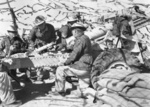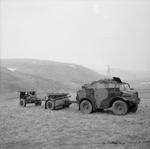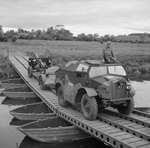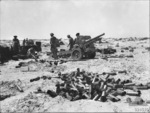Ordnance QF 25 pounder Field Gun
| Country of Origin | United Kingdom |
| Type | Field Gun |
| Caliber | 87.600 mm |
| Length | 5.530 m |
| Weight | 1800.000 kg |
| Ammunition Weight | 11.30 kg |
| Rate of Fire | 7 rounds/min |
| Range | 12.250 km |
| Muzzle Velocity | 518 m/s |
Contributor: C. Peter Chen
ww2dbaseThe Ordnance QF 25 pounder field guns, also known as 25-pdr field guns, were designed to replace the 18-pdr field guns and 4.5-inch howitzers predecessors. They were designed in the 1930s with the tight budget, and they entered service in teh late 1930s. A standard crew of a 25-pdr field gun consisted of four or five men, usually leading by a sergeant. They usually fired high explosive shells, but it was not rare to see them firing smoke, star, flare, and propaganda leaflet shells. During WW2, they were among the most numerous field guns in British and Commonwealth forces, with each division fielding somewhere between 20 and 72 of them. 25-pdr field guns were usually towed by a Morris C8 4x4 Field Artillery Tractor ("Quad"), but after 1944 some of them were converted to be self-propelled with a Ram tank chassis (new designation: Sexton). Baby 25 pr field guns, an Australian pack gun variant of the design, were produced between 1943 and 1945; the guns and the carriages were made smaller to suit jungle combat in the South Pacific, with the ability to be broken into 13 sections for ease of transport through thick jungle growth by troops. After receiving overwhelmingly favorable reviews during WW2, they remained in active service in the United Kingdom and some of the Commonwealth nations until the 1960s, and served as training weapons or reserve weapons until the 1970s. One of the last combat uses of the 25-pdr field guns was by Kurdish forces in Northern Iraq in 2003. Ammunition for the weapon is currently produced by Pakistan Ordnance Factories.
Source: Wikipedia.
ww2dbaseLast Major Revision: Dec 2008
Ordnance QF 25 pounder Field Gun Interactive Map
Photographs
 |  |  |  |
Did you enjoy this article or find this article helpful? If so, please consider supporting us on Patreon. Even $1 per month will go a long way! Thank you. Share this article with your friends: Stay updated with WW2DB: |
Visitor Submitted Comments
31 Jul 2009 04:35:04 AM
Calibre may have been 876mm but not 87 m
3 Aug 2009 04:44:30 AM
Calibre shown above is 87,600 mm which is incorrect.
Australian Regiments were 3 battries of 6 guns.
13 Jun 2010 03:15:54 AM
weight 1800.000 kg ??
1800 tons? really...
13 Jun 2010 01:13:20 PM
Seagate, thanks for visiting the site and leaving your comment! 1800 kg = 1.8 tons
22 Jun 2010 04:27:35 AM
What is the correct colour of the 25pdr, i have just sprayed one the traditional colour of Brunswick Green as i was informed only to be told its wrong !!! any suggestions....
6 Sep 2010 09:42:32 AM
"correct" color depends on the time period and theater of operations.... normally it should be deep bronze green (home service), but sand, sand with medium green or black disruptive pattern (N. Africa and Italy) and olive drab with black 'Mickey Mouse" circle patterns camo for NW Europe in WWII are all correct.
17 Jan 2018 06:16:43 PM
Good article, but why was a 25-pounder called a 25-pounder? Did something actually weigh or cost 25 pounds? Thx
17 Jan 2018 10:12:04 PM
PJ (above):
The British artillery naming custom is to name the gun for the weight of the projectile it shoots. So, a 25-pounder launches a 25 pound shell (11.3 kg).
18 Jan 2018 02:54:08 PM
Thanks for clarifying!
All visitor submitted comments are opinions of those making the submissions and do not reflect views of WW2DB.
- » Wreck of USS Edsall Found (14 Nov 2024)
- » Autumn 2024 Fundraiser (7 Nov 2024)
- » Nobel Peace Prize for the Atomic Bomb Survivors Organization (11 Oct 2024)
- » Wreck of USS Stewart/DD-224 Found (2 Oct 2024)
- » See all news
 |
- » 1,150 biographies
- » 337 events
- » 43,917 timeline entries
- » 1,241 ships
- » 350 aircraft models
- » 207 vehicle models
- » 374 weapon models
- » 123 historical documents
- » 260 facilities
- » 470 book reviews
- » 28,543 photos
- » 432 maps
Winston Churchill, 1935
Please consider supporting us on Patreon. Even $1 a month will go a long way. Thank you!
Or, please support us by purchasing some WW2DB merchandise at TeeSpring, Thank you!
11 Jul 2009 02:31:29 AM
British Field (and RHA) Artillery Regiments during the Second World War were organized into three gun Batteries, each of eight guns in two troops of four. Three such Regiments would be allocated to Infantry and Armoured Divisions giving a nominal total of 72 gun(3 x 24)per Division. In the Western Desert however (due to a shortage of trained personnel to operate the Battery HQs it was not uncommon however to find Regiments consisting of just two batteries with six guns each.